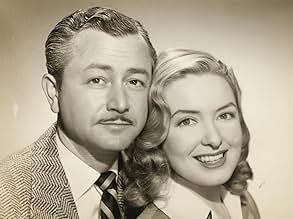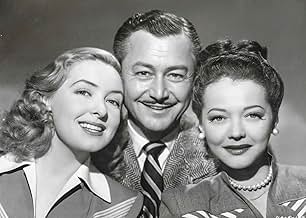Ajouter une intrigue dans votre langueAlways the diplomat, Alex Hazen is slow to take sides in Europe of the 1920s and 1930s. Cassie Bowman wants him to be more decisive and leaves him in Rome just as Mussolini is coming to powe... Tout lireAlways the diplomat, Alex Hazen is slow to take sides in Europe of the 1920s and 1930s. Cassie Bowman wants him to be more decisive and leaves him in Rome just as Mussolini is coming to power. There Alex marries Emily, daughter of a newspaper publisher who hires Cassie for his Pa... Tout lireAlways the diplomat, Alex Hazen is slow to take sides in Europe of the 1920s and 1930s. Cassie Bowman wants him to be more decisive and leaves him in Rome just as Mussolini is coming to power. There Alex marries Emily, daughter of a newspaper publisher who hires Cassie for his Paris bureau -- just before retiring from active management of his paper. Alex and Emily's s... Tout lire
- Réalisation
- Scénario
- Casting principal
- Party Guest
- (non crédité)
- Reporter
- (non crédité)
Avis à la une
Also the form of the film is a fascinating composition, starting at present time (1946) as all the protagonists gather for the first time in many years to enter a serious discussion none of them really desires, which brings them back to another day when they all were together in Rome as Mussolini took over power... and then comes an hour of flashbacks through all the traumatic convulsions of Europe between the two world wars, from the rise of German Nazism to the Spanish civil war and the controversial peace treaty of Munich.
I loved this film all through from the first moment to the last, the dialogue is replenished with intensive importance all the way, the characters couldn't have been acted better, there is no flaw anywhere, it flows organically on like taken directly out of reality, it's intelligent and important and well up to the same level as William Dieterle's other excellent films at the time. And through it all flows also Victor Young's gorgeous music, to make it even better...
The film itself is very handsome, in a less-than-dynamic sort of way. (How could any film with Robert Young and Ann Richards as 2/3rds of its central trio be described as "dynamic"?) The screenplay is good, though, and Sidney is first-rate.
The theatrical version of Hellman's story was notable for a flashy early appearance by Montgomery Clift (as the ambassador's son). Not a huge success, but acclaimed nonetheless. Frankly, the writing's better for the screenplay.
There's a lot, too, to be said for the sort of noir-flavored, female-centered drama that Hal Wallis and (frequently) William Dieterle produced in this era. "Love Letters," for instance, "The Accused" ... That plus the Hellman style make an intriguing (as well as intrigue-filled) combination.
For mainstream Hollywood, this idea-driven story was an honorable attempt to dramatize issues of conscience and responsibility [though criticism of official silence about budding fascist regimes was surely a bit late by 1946]. However, everyone gets to face a moral crisis here, from crusty Grandpa [Dudley Digges] down to a waiter who pauses to deliver a lecture on Woodrow Wilson, and marrying its serious ideas with an uncompelling love triangle seems contrived.
Hellman writes literate but non-stop dialogue, making everyone mouth the same high-minded generalities ["Whenever people talk about not taking sides, they've already taken one," or "People who know what they want don't wait to get it."] After an hour of politely listening to such unlikely repartee, we gradually grow weary, then dismayed, and finally exasperated. Was Hellman paid by the word, like Dickens?
This torrent of talk leaves no room for the film to breathe, so all of William Dieterle's fluent staging produces only claustrophobia. Also, while Lee Garmes' exquisite lighting and Hans Dreier's cavernous interiors mark a high point in Hollywood gloss, the decor is so fancy that we in the audience can only goggle in awe at the dilemmas of these privileged power-brokers, surely not what Hellman intended. Still, as James Agee noted, "People as highly civilized as these are seldom seen in the movies, and are still more seldom played with understanding." True, but one is tempted to throw buckets of ice water on the cast to stop their debating.
Le saviez-vous
- AnecdotesOne of over 700 Paramount Productions, filmed between 1929 and 1949, which were sold to MCA/Universal in 1958 for television distribution, and have been owned and controlled by Universal ever since. Its earliest documented telecast took place in Seattle 27 February 1959 on KIRO (Channel 7), followed by Omaha 1 March 1959 on KETV (Channel 7), by Asheville 24 May 1959 on WLOS (Channel 13), by Grand Rapids 27 September 1959 on WOOD (Channel 8), by Milwaukee 6 October 1959 on WITI (Channel 6), by Pittsburgh 21 November 1959 on KDKA (Channel 2), and by Indianapolis 3 December 1960 on WFBM (Channel 6).
Meilleurs choix
Détails
- Date de sortie
- Pays d’origine
- Langues
- Aussi connu sous le nom de
- The Searching Wind
- Lieux de tournage
- Société de production
- Voir plus de crédits d'entreprise sur IMDbPro
- Durée
- 1h 48min(108 min)
- Couleur
- Rapport de forme
- 1.37 : 1

































